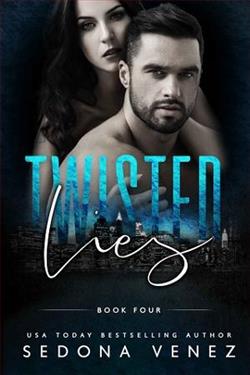Page 22 of Murder on the Brighton Express
“You may speak to me instead.”
“Do you know what stories Ruth was working on at the time of her death? Do you know why she went to Brighton?”
His lips pursed again as he considered his answer.
I saved him the effort of coming up with something. “It seems you can’t help me, Mr. Finlayson. What is the gossip columnist’s name?”
He picked up the newspaper I’d put down a few minutes earlier and flipped the pages until he reached the relevant section. He pointed to the byline. “We call her Mrs. Scoop.”
“Is that her real name?”
“Of course not. She stipulated anonymity in her contract.” He folded up the newspaper and slapped it back onto the pile. “The passing of Ruth Price is very sad. That’s allThe Evening Bulletinhas to say on the matter at this point.” He indicated the door to the street. “If that’s all, Miss Fox…”
Something wasn’t right. The clerk had fetched someone to speak to me about Ruth, and Mr. Finlayson had immediately put aside whatever he was doing to meet me. The newspaper’s editor would be very busy. So why bother with me at all?
“Why won’t you talk to me about Ruth?”
“There’s nothing to tell,” Mr. Finlayson said.
“Her work here may be related to her cause of death. You see, I don’t believe she threw herself off that train.”
“Why not?”
“I met her brother this morning. He claims she believed suicide to be a terrible sin.”
“What led you to speak to the brother? You must have already had a reason to think she wouldn’t kill herself. What was it?”
I could have told him I’d met Ruth in Brighton, but I held that information back. His questions were unsettling, particularly when I was supposed to be the one questioning him. “I don’t understand why you’re obstructing me, Mr. Finlayson. Don’t you want me to get to the bottom of the mystery? Don’t you think Ruth Price deserves justice?”
“You seem to be suggesting she was murdered, Miss Fox. If you are a private detective, someone must have hired you. Was it her brother?”
His habit of answering my question with his own was becoming frustrating. My patience was thinning. Was this how it felt to be on the other end of one of my interrogations?
I employed a tactic some of my suspects used on me and stayed silent.
Mr. Finlayson was undeterred. “Are you a private detective, or are you an assistant to a journalist at another newspaper?”
I blinked at him. “Why would I lie?”
“The death of a young woman on a train from Brighton to London is a good story, particularly if there’s more to it than suicide. If anyone prints the story, it will beThe Evening Bulletin, not one of our rivals. She wasouremployee, and we should be the ones to print it first. But thank you for confirming a common opinion around the office. Now we know to pursue the story.”
I stared at him, open-mouthed.
He indicated the door again but did not wait for me to leave. He turned and marched back into the newsroom.
The clerk at the desk cleared his throat and glanced pointedly at the exit. At that moment, the door opened and two people entered. The first was an elderly gentleman brandishing a copy of the latest edition of the newspaper. He slapped it down on the front desk and began to list his complaints about the contents.
The person who entered behind him was a thin, blonde woman around forty years of age with hawkish features. She brushed past me, her head down as she read a piece of paper. An unkind person would describe her as having a long nose and sunken chin.
Seeing her confirmed the earlier thought that had taken root when Mr. Finlayson told me Ruth worked for a gossip columnist. The blonde woman must be the same one Harry was looking for, the one who wanted to gather information about the Hessing-Liddicoat wedding. Her features were too distinctive for there to be another. Ruth Price worked for her. When she saw us in Brighton, or overheard the Bainbridge name, she linked us to the hotel venue for the wedding reception. I doubted we were the reason she was in Brighton, but she saw an opportunity to gather information while we were there.
I was that opportunity. Somehow, she knew I solved murders, and she was counting on the fact I wouldn’t want my sleuthing becoming public knowledge. When she returned to London, she planned to blackmail me into revealing some wedding details to pass on to her employer, Mrs. Scoop.
While the clerk’s head was bent over his notes to write down yet another complaint from a member of the public, I slipped into the newsroom. Despite the open windows, it was warm and smelled faintly of ink. The chorus of chatter and mechanical rhythm of typewriter keys was surprisingly comforting. Perhaps that was because it meant everyone was too busy to notice an intruder in their midst.
Before I reached the room where Mrs. Scoop had gone, the door opened, and she re-emerged. She passed me with a long-legged strut, her attention once again focused on the paper in her hand. She exited the newsroom altogether.
Sometimes, situations change, and a good detective must pivot accordingly. Mrs. Scoop’s departure could benefit me. Like Mr. Finlayson, she probably wouldn’t divulge anything to me willingly. I needed to employ more devious methods and her absence was perfectly timed.















